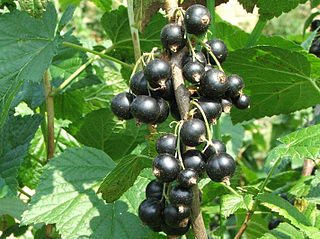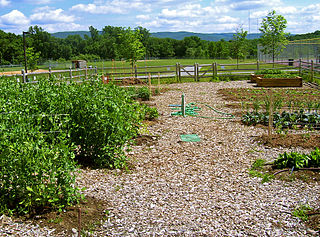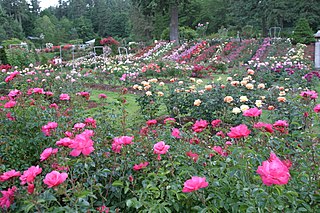
Broccoli is an edible green plant in the cabbage family whose large flowering head, stalk and small associated leaves are eaten as a vegetable. Broccoli is classified in the Italica cultivar group of the species Brassica oleracea. Broccoli has large flower heads, usually dark green, arranged in a tree-like structure branching out from a thick stalk which is usually light green. The mass of flower heads is surrounded by leaves. Broccoli resembles cauliflower, which is a different but closely related cultivar group of the same Brassica species.

The blackcurrant, also known as black currant or cassis, is a deciduous shrub in the family Grossulariaceae grown for its edible berries. It is native to temperate parts of central and northern Europe and northern Asia, where it prefers damp fertile soils. It is widely cultivated both commercially and domestically.

Organic horticulture is the science and art of growing fruits, vegetables, flowers, or ornamental plants by following the essential principles of organic agriculture in soil building and conservation, pest management, and heirloom variety preservation.

The Gardens at Elm Bank, home of Massachusetts Horticultural Society, occupies 36 acres (15 ha) of Elm Bank Reservation, a 175-acre (71 ha) recreational area of woodlands, fields, and former estate property on the Charles River managed by the Massachusetts Department of Conservation and Recreation. The estate's entrance is located at 900 Washington Street, Wellesley, Massachusetts, United States, with the major portion of the grounds located in the neighboring town of Dover. In 1987, the entire site was added to the National Register of Historic Places as Elm Bank.

Burpee Seeds and Plants, officially W. Atlee Burpee & Co., is an American seed and plant company that was founded by Washington Atlee Burpee in Pennsylvania in 1876.

The Award of Garden Merit (AGM) is a long-established annual award for plants by the British Royal Horticultural Society (RHS). It is based on assessment of the plants' performance under UK growing conditions.

The Michigan State University Horticulture Gardens are horticultural gardens, with a landscape arboretum, located on Bogue Street on the Michigan State University campus in East Lansing, Michigan. The gardens are open to the public daily without charge.

The JC Raulston Arboretum is a 10-acre (40,000 m2) arboretum and botanical garden administered by North Carolina State University, and located in Raleigh, North Carolina. It is open daily to the public without charge.
This is an alphabetical index of articles related to gardening.

Concours international de roses nouvelles de Bagatelle is held in June of each year in the rose trial grounds of the Château de Bagatelle in Paris's 16th arrondissement.
The Massachusetts Horticultural Society, sometimes abbreviated to MassHort, is an American horticultural society based in Massachusetts. It describes itself as the oldest formally organized horticultural institution in the United States. In its mission statement, the society dedicates itself to encouraging the science and practice of horticulture and developing the public's enjoyment, appreciation, and understanding of plants and the environment. As of 2014, it had some 5,000 members.

Buddleja davidii, also called summer lilac, butterfly-bush, or orange eye, is a species of flowering plant in the family Scrophulariaceae, native to Sichuan and Hubei provinces in central China, and also Japan. It is widely used as an ornamental plant, and many named varieties are in cultivation. The genus was named Buddleja after Reverend Adam Buddle, an English botanist. The species name davidii honors the French missionary and explorer in China, Father Armand David, who was the first European to report the shrub. It was found near Ichang by Dr Augustine Henry about 1887 and sent to St Petersburg. Another botanist-missionary in China, Jean-André Soulié, sent seed to the French nursery Vilmorin, and B. davidii entered commerce in the 1890s.
The national headquarters for Park Seed Company, Jackson & Perkins, and Wayside Gardens is located in Greenwood, South Carolina. The headquarters complex is surrounded by 9 acres (36,000 m2) of land that are maintained by the Park Seed Company for many purposes. The trial gardens previously featured on the grounds closed in 2013 as the company shifted to a fully eCommerce based retail platform.

A trial garden is a type of garden grown specifically for the purpose of testing and evaluating plants. Universities, plant breeders, and garden-industry companies frequently have trial gardens, as do many private and public botanical gardens and professional garden journalists. In the classic trials model, newly developed varieties of plants are compared with the closest similar industry standard plant throughout their life cycle—from germination/propagation through maturity, from seed to harvest. By growing new varieties side-by-side with existing ones, researchers can determine whether these new varieties are indeed better, and, if so, in what respects.

Rose trial grounds or rose test gardens are agricultural areas where garden roses are grown to be assessed for qualities such as health, floriferousness, novelty, and scent.

The Celebrity tomato cultivar is a hybrid (biology) that produces long fruit-bearing stems holding 20 or more very plump, robust tomatoes. Fruits weigh approximately 8 oz., and are 4 inches across. Plants need caging or staking, and produce fruit throughout the growing season. The celebrity tomato is a cultivar of the species Solanum lycopersicum. It is a crossbreed of the common tomato that is widely used for various culinary purposes. This tomato is of great size and is known to be resistant to most tomato diseases such as Fusarium wilt, Verticillium wilt, Tobacco mosaic virus and Root-knot nematode due to its hybrid nature. Celebrity tomatoes are highly adaptive to harsh environments and can grow in a wide range of places including dry, humid and wet regions. They are resistant to cracking and splitting which usually occurs when there is an excess of water and sugar movement in the fruits. Therefore, causing the tomato skin to grow at a slower rate compared to the expansion of the fruit. They can survive in harsh uneven rainfall. However, they are highly susceptible to colder environments and are at a higher risk of dying in regions with short growing seasons. The plants can grow up to 5 feet in height with bright red medium-sized fruits. The plants are generally very thick and grow in clusters. The tomato fruits are mostly used in the making of various salsas, salads, juices and canned food.
Regional Agricultural Research Station, Pattambi is a research Station under the Central Zone of Kerala Agricultural University at Pattambi in Palakkad district of Kerala, India.

The Indian Institute of Horticultural Research (IIHR) is an autonomous organization acting as a nodal agency for basic, strategic, anticipatory and applied research on various aspects of horticulture such as fruits, vegetable, ornamental, medicinal and aromatic plants and mushrooms in India. The institute has its headquarters in Bengaluru, Karnataka, India and is a subsidiary of Indian Council of Agricultural Research (ICAR), New Delhi, under the Ministry of Agriculture, India. It recently has been ranked 1st for the combined years 2019-20 and 2020-21 by the ICAR.
The All-America Rose Selections (AARS) is an award that was given annually, from 1940 to 2013, by the American rose industry to an outstanding new rose variety. The AARS selection was regarded as the most prestigious rose prize in the United States for 73 years. AARS was discontinued after 2013, and was replaced in 2016 by the new American Garden Rose Selections (AGRS) program.
The American Garden Rose Selections (AGRS) is an annual award sponsored by the American rose industry to acknowledge and recommend outstanding rose varieties for different regions of the United States. AGRS replaced the long-established All-America Rose Selections, which was discontinued after 2012. AGRS's first annual award was introduced in 2016. The AGRS selection process involves rose trials in multiple regional test gardens throughout the U.S. Promising rose varieties are grown and evaluated multiple times a year for two years. Only 4% of all the roses tested in the program are selected for the AGRS award.













